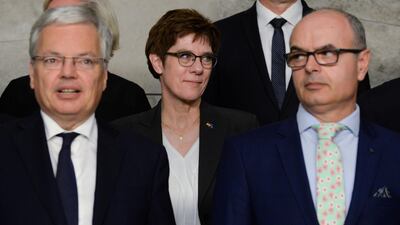Germany's defence minister on Thursday presented to Nato her proposal for a security zone in northern Syria, receiving support from Turkey and the US.
But the secretary general of Nato, Jens Stoltenberg, said the plan might need to involve the UN.
Annegret Kramp-Karrenbauer said an internationally controlled zone would also need Russia if it were to protect displaced civilians and ensure the fight continued against ISIS militants.
But Ms Kramp-Karrenbauer told Nato defence ministers in Brussels that the task of patrolling the Turkish-Syrian border could not fall to Russia and Turkey alone.
"The status quo is not a satisfactory solution," she said.
It is the first time Berlin has proposed a military mission in the Middle East.
It has at least steadied the alliance, which was shaken by US President Donald Trump's decision to withdraw troops from Syria and Turkey's military operation launched on October 9, diplomats said.
Europe was angered by Turkey's offensive against Kurdish troops who fought alongside the US against ISIS, and EU governments have frozen arms sales in protest against the Syrian invasion.
US Defence Secretary Mark Esper, in Brussels on Thursday, said the Turkish incursion was "unwarranted".
Under Tuesday's deal struck between Russia and Turkey in Sochi, Ankara has agreed to restrict its military operations in northern Syria to the border region.
But European allies are still anxious about Turkish plans to remove Kurdish YPG fighters and their weapons from the border.
Ankara regards the YPG as terrorists linked to Kurdish insurgents in south-east Turkey.
European allies, who need Turkey's help to prevent ISIS fighters in Syria fleeing to Europe, have long supported efforts to give the Kurds more rights and the chance of greater autonomy in majority regions.
Ms Kramp-Karrenbauer later said she received reassurances from Ankara that the Turkish invasion would not lead to a mass population resettlement or ethnic cleansing
"The Sochi agreement has not brought peace and it doesn't offer a basis for a political solution in the long run," she said. "We are looking for a solution that includes the international community."
While few details were available, Turkey, Mr Esper and Mr Stoltenberg welcomed Ms Kramp-Karrenbauer's plan, which was a rare proposal by a country wary of Middle East military missions.
Earlier, she met Turkish Defence Minister Hulusi Akar, who later briefed Nato ministers on Turkey's operations in Syria.
"More talks are necessary but the Turkish minister said he is open to the proposal," one Nato diplomat said.
Another said German Chancellor Angela Merkel could discuss it with Turkish, British and French leaders at the Nato summit in London on December 4.
Mr Stoltenberg said there was no call for a Nato mission in northern Syria and his understanding was that there could be a need for "a process in the UN".
"It's not possible today to say whether that will be easy or very difficult, so I think this is a proposal which has to be discussed more in detail," he said.
Mr Esper said before the Nato meeting that while he had not taken a detailed look at the German proposal, he was supportive, although Washington did not intend to contribute troops.
"I think it's fine, I think it is good for those countries who want to step up and help improve security in that part of the world," Mr Esper said.
"It is something that we've been calling on our European partners to do for quite some time, to step up and do more.
He had been expected to meet Mr Akar on Thursday, but the meeting might be postponed.

